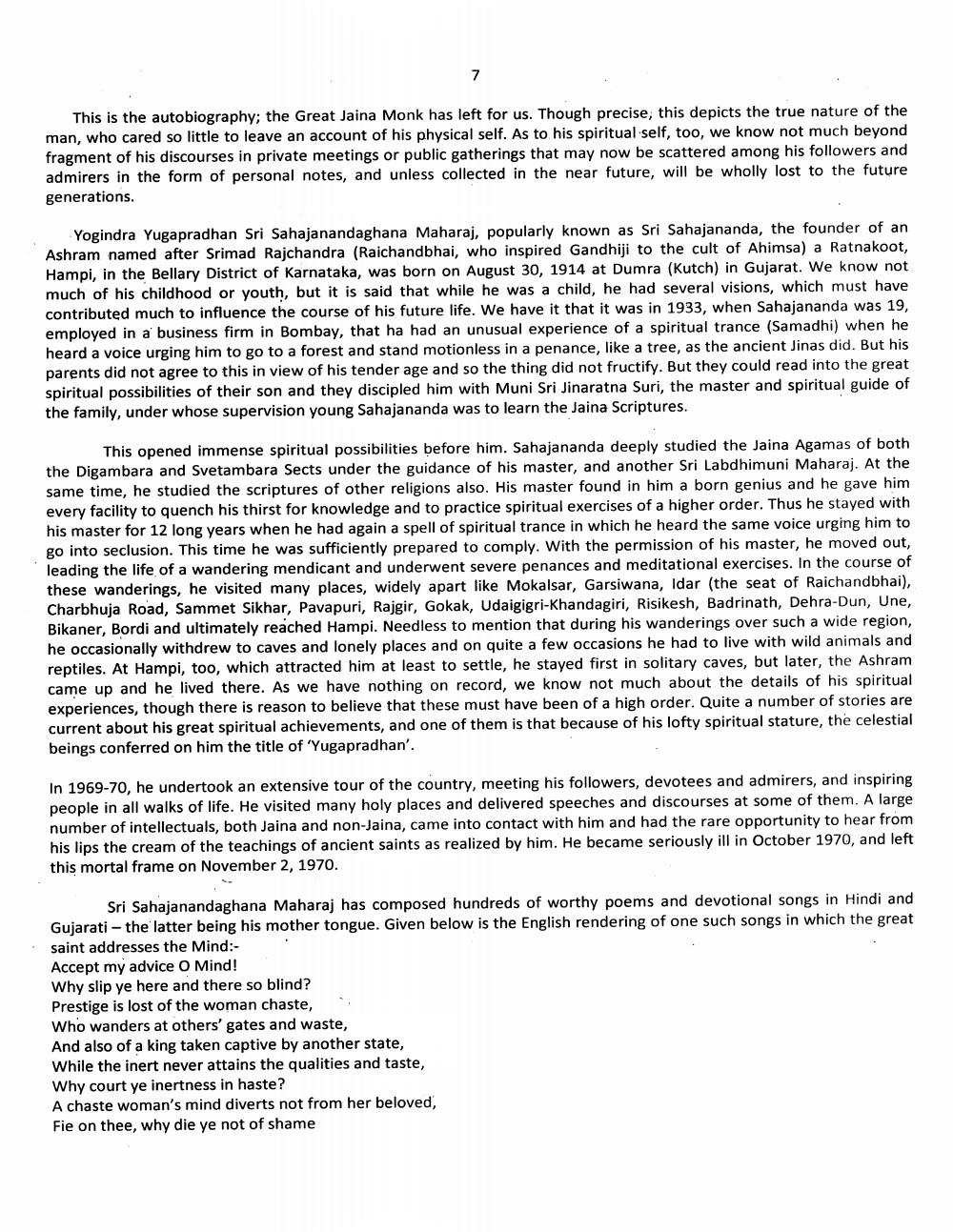________________
This is the autobiography; the Great Jaina Monk has left for us. Though precise, this depicts the true nature of the man, who cared so little to leave an account of his physical self. As to his spiritual self, too, we know not much beyond fragment of his discourses in private meetings or public gatherings that may now be scattered among his followers and admirers in the form of personal notes, and unless collected in the near future, will be wholly lost to the future generations.
Yogindra Yugapradhan Sri Sahajanandaghana Maharaj, popularly known as Sri Sahajananda, the founder of an Ashram named after Srimad Rajchandra (Raichandbhai, who inspired Gandhiji to the cult of Ahimsa) a Ratnakoot, Hampi, in the Bellary District of Karnataka, was born on August 30, 1914 at Dumra (Kutch) in Gujarat. We know not much of his childhood or youth, but it is said that while he was a child, he had several visions, which must have contributed much to influence the course of his future life. We have it that it was in 1933, when Sahajananda was 19, employed in a business firm in Bombay, that ha had an unusual experience of a spiritual trance (Samadhi) when he heard a voice urging him to go to a forest and stand motionless in a penance, like a tree, as the ancient Jinas did. But his parents did not agree to this in view of his tender age and so the thing did not fructify. But they could read into the great spiritual possibilities of their son and they discipled him with Muni Sri Jinaratna Suri, the master and spiritual guide of the family, under whose supervision young Sahajananda was to learn the Jaina Scriptures.
This opened immense spiritual possibilities before him. Sahajananda deeply studied the Jaina Agamas of both the Digambara and Svetambara Sects under the guidance of his master, and another Sri Labdhimuni Maharaj. At the same time, he studied the scriptures of other religions also. His master found in him a born genius and he gave him every facility to quench his thirst for knowledge and to practice spiritual exercises of a higher order. Thus he stayed with his master for 12 long years when he had again a spell of spiritual trance in which he heard the same voice urging him to go into seclusion. This time he was sufficiently prepared to comply. With the permission of his master, he moved out, leading the life of a wandering mendicant and underwent severe penances and meditational exercises. In the course of these wanderings, he visited many places, widely apart like Mokalsar, Garsiwana, Idar (the seat of Raichandbhai), Charbhuja Road, Sammet Sikhar, Pavapuri, Rajgir, Gokak, Udaigigri-Khandagiri, Risikesh, Badrinath, Dehra-Dun, Une, Bikaner, Bordi and ultimately reached Hampi. Needless to mention that during his wanderings over such a wide region, he occasionally withdrew to caves and lonely places and on quite a few occasions he had to live with wild animals and reptiles. At Hampi, too, which attracted him at least to settle, he stayed first in solitary caves, but later, the Ashram came up and he lived there. As we have nothing on record, we know not much about the details of his spiritual experiences, though there is reason to believe that these must have been of a high order. Quite a number of stories are current about his great spiritual achievements, and one of them is that because of his lofty spiritual stature, the celestial beings conferred on him the title of 'Yugapradhan'.
In 1969-70, he undertook an extensive tour of the country, meeting his followers, devotees and admirers, and inspiring people in all walks of life. He visited many holy places and delivered speeches and discourses at some of them. A large number of intellectuals, both Jaina and non-Jaina, came into contact with him and had the rare opportunity to hear from his lips the cream of the teachings of ancient saints as realized by him. He became seriously ill in October 1970, and left this mortal frame on November 2, 1970.
Sri Sahajanandaghana Maharaj has composed hundreds of worthy poems and devotional songs in Hindi and Gujarati - the latter being his mother tongue. Given below is the English rendering of one such songs in which the great saint addresses the Mind:Accept my advice o Mind! Why slip ye here and there so blind? Prestige is lost of the woman chaste, Who wanders at others' gates and waste, And also of a king taken captive by another state, While the inert never attains the qualities and taste, Why court ye inertness in haste? A chaste woman's mind diverts not from her beloved, Fie on thee, why die ye not of shame




